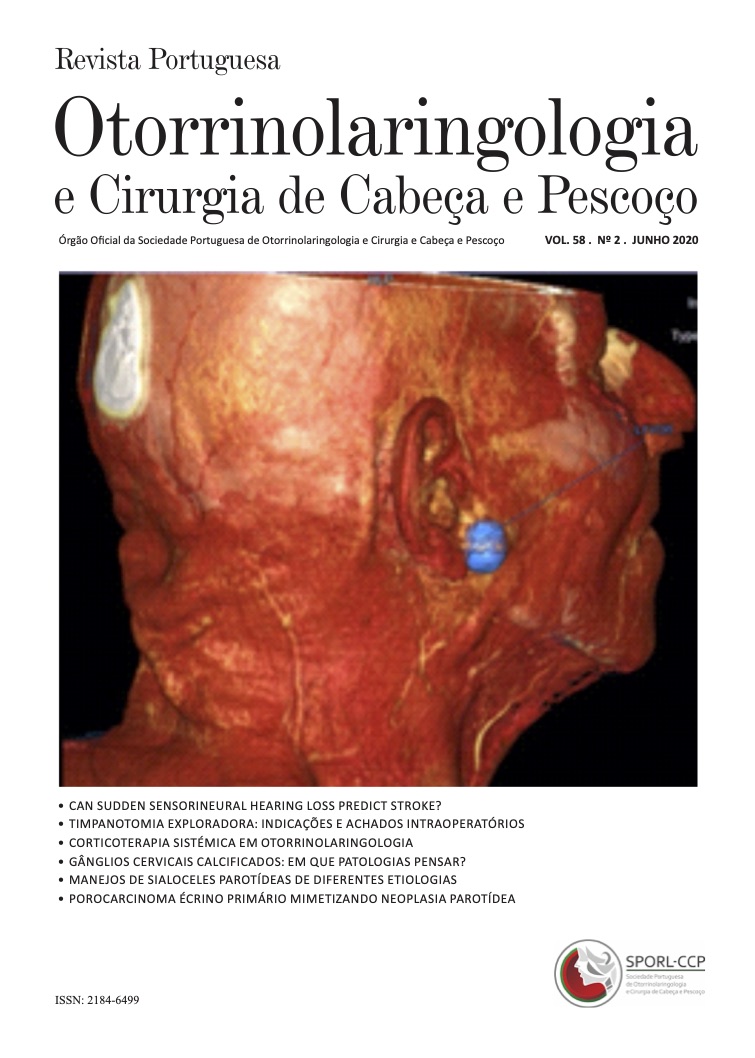Exploratory Tympanotomy: Indications and operative findings
DOI:
https://doi.org/10.34631/sporl.814Keywords:
Exploratory tympanotomy, conduction hearing loss, intraoperative diagnosisAbstract
Objectives: Review the main indications and intraoperative findings in patients undergoing exploratory tympanotomy.
Study design: Observational, retrospective, longitudinal study
Material and methods: All patients who underwent exploratory tympanotomy, in our institution, from 2015 to 2019 were included. Patients with pathologic findings at otoscopy were excluded.
Results: A total of 45 patients underwent unilateral exploratory tympanotomy. Of these, 19 were excluded due to pathologic findings in otoscopy. The mean age was 38,26 years (range 5-77 years). The main indication was conductive hearing loss (88%). Intraoperatively, the ossicular chain was fixed by adhesions (23%), followed by ossicular chain discontinuity (19%), otosclerosis (15%) and cholesteatoma (15%). There were no intra or postoperative complications.
Conclusions: Exploratory tympanotomy is a safe diagnostic technique, with added value, since it allows us to directly view the middle ear, obtain the correct diagnosis, and plan the surgical treatment.
Downloads
References
- Beyazal Çeliker, Fatma & Terzi, Suat & Beyazal, Mehmet & Celiker, et al. The Value of High Resolution Computed Tomography in Detecting the Causes of Conductive Hearing Loss. Van Medical Journal. 2018 Jan;25:399-402. doi:10.5505/vtd.2018.79095.
– Lempert J. Tympanosympathectomy; a surgical tèchnic for the relief of tinnitus aurium. Arch Otolaryngol. 1946 Mar;43:199-212. doi:10.1001/archotol.1946.00680050212001.
- Rosen S. Palpation of stapes for fixation; preliminary procedure to determine fenestration suitability in otosclerosis. AMA Arch Otolaryngol. 1952 Dec;56(6):610-5. Doi: 10.1001/archotol.1952.00710020635005.
– Rosen S, Bergman M. Mobilization of the stapes for otosclerotic deafness. Acta Otolaryngol Suppl. 1954;118:180-201. doi:10.3109/00016485409124007.
- Paparella MM, Koutroupas S. Exploratory tympanotomy revisited. Laryngoscope. 1982 May;92(5):531-4. doi:10.1288/00005537-198205000-00013.
– Robertson G, Mills R. Findings at exploratory tympanotomy for conductive hearing loss. J Laryngol Otol. 2009 Oct;123(10):1087-9. doi: 10.1017/S0022215109005696.
- Feeney MP, Grant IL, Marryott LP. Wideband energy reflectance measurements in adults with middle-ear disorders. J Speech Lang Hear Res. 2003 Aug;46(4):901-11. doi: 10.1044/1092-4388(2003/070).
- Sanford CA, Hunter LL, Feeney MP, Nakajima HH. Wideband Acoustic Immittance: tympanometric measures Ear Hear. 2013 Jul;34 Suppl 1:65S-71S. doi: 10.1097/AUD.0b013e31829c7250.
- Shaver MD, Sun XM. Wideband energy reflectance measurements: Effects of negative middle ear pressure and application of a pressure compensation procedure. J Acoust Soc Am. 2013 Jul;134(1):332-41. doi: 10.1121/1.4807509.
Downloads
Published
How to Cite
Issue
Section
License
Copyright (c) 2020 The authors retain copyright of this article.

This work is licensed under a Creative Commons Attribution-ShareAlike 4.0 International License.






